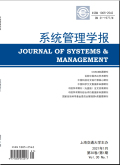系统管理学报2024,Vol.33Issue(1):1-15,15.DOI:10.3969/j.issn1005-2542.2024.01.001
考虑产运环节碳排放的生鲜低碳供应链运营决策
Operation Decisions of a Fresh Low-Carbon Supply Chain Considering Carbon Emission in Production and Transportation
摘要
Abstract
Considering that a retailer outsources logistics services to a third-party logistics(TPL)service provider and a manufacturer reduces carbon emissions,this paper explores the impact of carbon emission links and carbon policies on the operation decisions of a fresh low-carbon supply chain.By assuming that the service level of the TPL affects the freshness of fresh products and consumers have a low-carbon preference awareness,game models were constructed under carbon tax and carbon trading policies when considering carbon emissions from production alone and from both production and transportation,respectively.It is found that when considering production carbon emissions alone,the service level of the TPL is not affected by the change of carbon policy.However,when considering both production and transportation carbon emissions,the carbon emissions from transportation will generate additional costs,which will inhibit the willingness of the TPL to improve service level.If the carbon tax price is lower(higher)than the carbon trading price,the service level of the TPL under the carbon tax policy is also lower(higher)than the carbon trading policy.Furthermore,considering the special case that the logistics service cost,the freshness,and the carbon emission reduction cost are all power functions,it is found that the carbon emission behavior of supply chain members will indirectly weaken the reduction efforts of carbon-reduction enterprises.In the economically developed stage,in which the carbon-reduction technology is more mature,the government will be more inclined to implement the carbon trading policy.Non-carbon-reduction enterprises will act as the free riders,who can benefit from the increase of consumers'willingness to pay and market demand caused by emission reduction enterprise.The profits of supply chain members are not necessarily damaged by the carbon emissions from the transportation.However,they will benefit from the rising market demand under certain circumstances.关键词
碳税/碳交易/碳减排/生鲜低碳供应链/第三方物流服务商Key words
carbon tax/carbon trading/carbon reduction/fresh low-carbon supply chain/third-party logistics(TPL)分类
管理科学引用本文复制引用
冯颖,冯仰超,张景雄,宣彪,张炎治..考虑产运环节碳排放的生鲜低碳供应链运营决策[J].系统管理学报,2024,33(1):1-15,15.基金项目
教育部人文社会科学基金资助项目(23YJA630135) (23YJA630135)
中央高校基本科研业务经费资助项目(2023SKHQ01) (2023SKHQ01)
江苏省高校哲学社会科学研究项目(2021SJA1014) (2021SJA1014)

